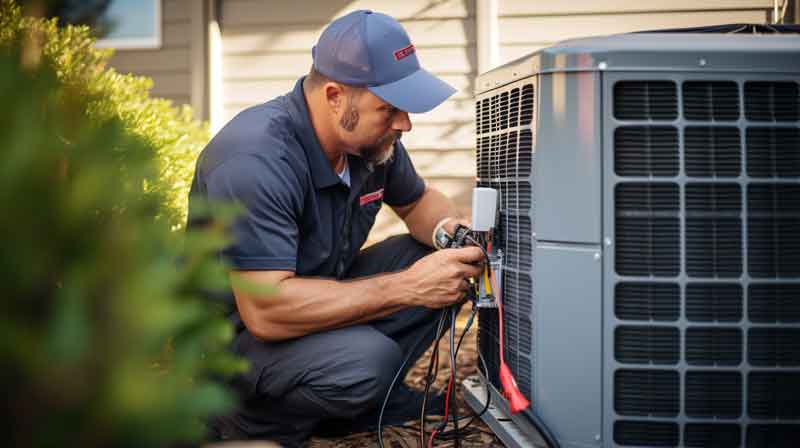
A First-time Homebuyer’s Guide to Home Maintenance
Buying your first home is a significant milestone, and it feels exhilarating to finally own a house. However, homeownership also comes with responsibility. An essential part of owning a house is maintenance. As a first-time homebuyer, it’s crucial to understand what you need to maintain to keep your property in good shape.
Home maintenance may seem daunting, but with the proper knowledge and preparation, homeownership can be a breeze. Here are a few helpful tips on how to keep your home in excellent condition and avoid common maintenance mistakes.
Know Your Homes Critical Systems:
You don’t need to be an expert but, it’s important to know that what these systems are, all the functions they perform and have regular preventive maintenance checks and services.
- A properly functioning heating, ventilation, and air conditioning (HVAC) system is critical for maintaining indoor comfort and air quality. As a homeowner, you should understand the basics of how your HVAC system operates. Check the air filters monthly and change them regularly. Schedule regular HVAC maintenance with a licensed and qualified technician to keep your system operating efficiently and identify potential issues before they become costly repairs.
- Gutters and Downspouts. Gutters that are clogged with leaves, debris, and water can cause significant damage to a house’s foundation and roof. As a homeowner, inspect and clean the gutters and downspouts regularly. If left unchecked, clogged gutters can lead to water damage, foundation problems, and basement flooding.
- Electrical Systems. Your home’s electrical system is complex and vital to everyday life. Inspect your electrical outlets and wiring regularly for signs of damage and wear. Check the circuit breaker panel to see if any breakers have tripped and replace any that continuously trip. If you notice any electrical issues, hire a licensed electrician to diagnose and repair the problem.
- Water damage can be an expensive and time-consuming problem to fix. Regularly inspect your pipes and plumbing fixtures for any leaks, rust, or corrosion. Ensure that the drainpipes and gutters are functioning correctly and keep an eye out for any water spots or discolored walls and ceilings. If you have any concerns, consult with a licensed plumber.
- Roof and Windows. Your roof and windows are your home’s primary defenses against the elements, so it’s essential to maintain them. Conduct regular inspections of the roof and look for any signs of wear or damage, such as cracked or missing shingles. Clean your gutters and downspouts to prevent clogs that can lead to water damage. Inspect the windows and look for any cracks, leaks, or damage.
Create a home maintenance schedule:
A maintenance schedule is the best way to ensure that your home remains in excellent condition. Create a list of all the tasks you need to do, including when they should be done and how often. For instance, you might need to clean gutters in the fall, change air filters every three months, and have your HVAC system serviced annually. A maintenance schedule ensures that you don’t miss any essential tasks to keep your home in excellent shape.
Learn basic DIY skills:
Not all home maintenance tasks require a professional handyman. Learn basic DIY skills, such as changing light bulbs, repairing leaking faucets, painting walls, and unclogging drains. With the internet as a valuable resource, you can find step-by-step guides and tutorials to help you tackle simple repairs yourself. However, be honest about your limitations, and don’t attempt risky repairs you can’t handle.
Check for water damage:
Water damage can be costly and dangerous, causing mold growth, warping wood, and even weakening your home’s structure. Knowing how to spot water damage and addressing it promptly can prevent significant issues. Check for signs of water damage, such as brown stains on the ceiling, musty smells, and water puddles. Inspect your home’s plumbing system, including pipes, toilets, and water heaters, to ensure they’re not leaking.
Maintain your home’s exterior:
Your home’s exterior is the first impression visitors get when they approach your property. Maintaining your home’s exterior improves curb appeal and also keeps your home safe from damage. Regularly clean gutters, trim bushes, mow the lawn, and pressure-wash your home’s siding. Inspect your home’s roof to ensure it’s not leaking or damaged. Regular upkeep of your home’s exterior can also prevent pest infestations.
Budget for maintenance:
Home maintenance expenses can add up quickly, making it essential to budget for them. Even if you aren’t experiencing any significant issues, it’s smart to set aside money for unexpected repairs. With a budget, you can avoid dipping into your savings or racking up credit card debt when a problem arises. A rule of thumb is to set aside one percent of your home’s total value annually for maintenance.
Conclusion:
Owning a home is exciting, but it can also be overwhelming, especially for first-time homebuyers. Home maintenance can help keep your house safe, comfortable, and in good condition. By following these tips, you can minimize expensive repairs and keep your home in excellent condition for years to come. Remember, regular maintenance can save you money and ensure you get the maximum value from your investment.
Homeownership can be a rewarding experience, but it comes with responsibilities. Fortunately, with preparation and knowledge, maintaining your property can be manageable and even enjoyable. Remember to create a maintenance schedule, learn DIY skills, be proactive about preventative maintenance of critical systems, and budget for maintenance. Taking these steps can help ensure that your first home remains in perfect condition for years to come.